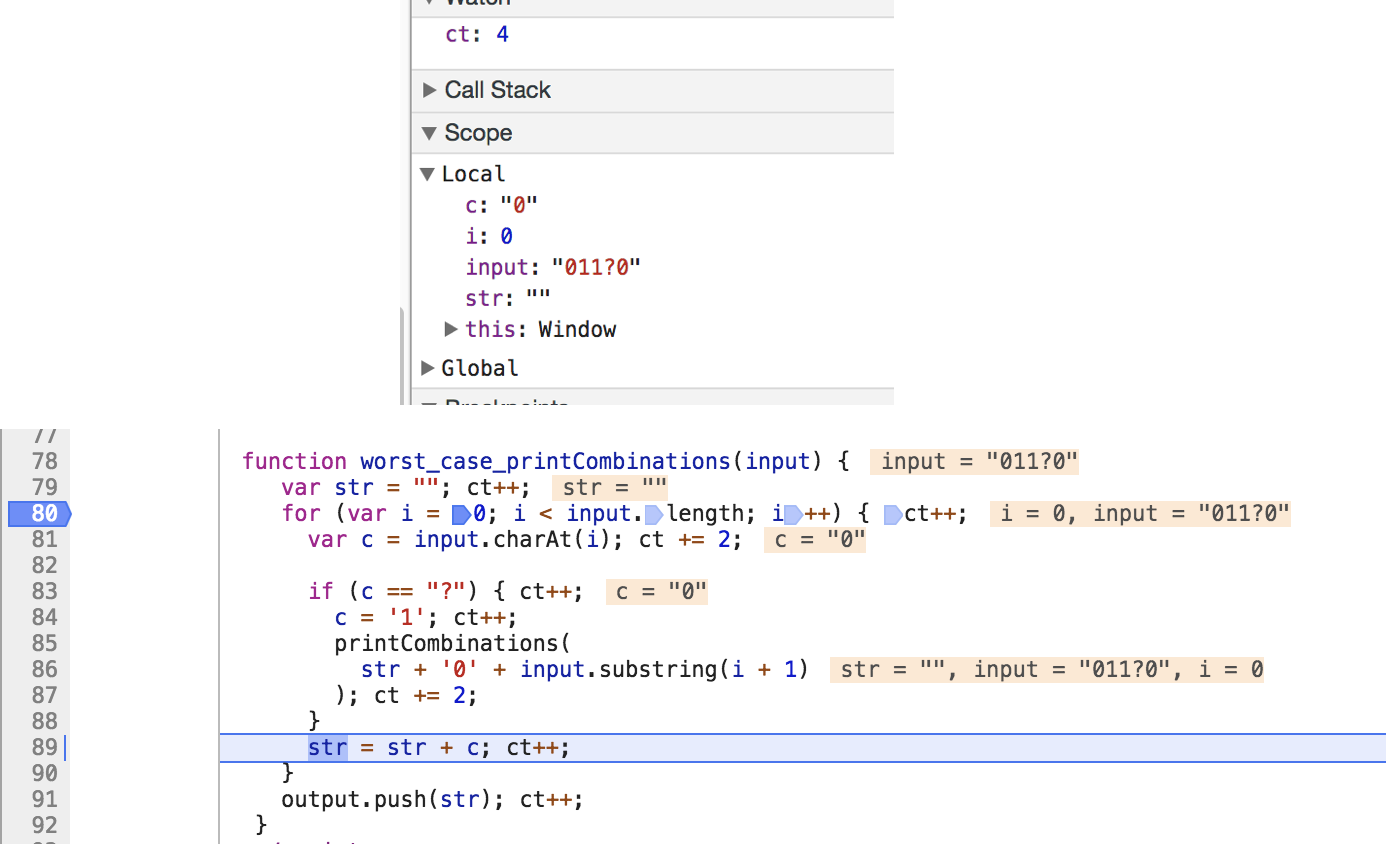Hey 👋 new reader,
Pluralsight gave me some free1 month
, get them before
subscriptions
they are gone!
Solving Google Interview Questions
24 Nov 2017 · 6 mins read Edit PostA simple technical algorithm question, asked at Google interviews taken from a user on Glassdoor.
Question:
Find all string combinations consisting only of 0, 1, where ? can be either 0 or 1
Input: string containing characters 0, 1 and ?, where ? is a wildcard for 0 or 1. Output: print all possible combinations of the string.
Example Input
“011?0”
Example Output
[“01100”, “01110”]
Worst Case
To solve problems like these, a good method is to think of any solution you can think of. This is likely to be the worst case solution.
For this problem, my worst case solution is this:
Setup Code
var output = [];
var input = "011?0";
print(input);
console.log(output);
Algorithm
function print(input) {
var str = "";
for(var i = 0; i < input.length; i++) {
var c = input.charAt(i);
if (c == "?") {
c = 1;
print(
str + '0' + input.substring(i + 1)
);
}
str = str + c;
}
output.push(str);
}
This algorithm loops over the string and builds a new one without the ‘?’ character. When it gets to a ‘?’ character, it builds a new string using a 0 instead of this ‘?’ and continues with this run, and re-calls the algorithm with the same string but with the ‘?’ replaced with a 1.
Complexity:
O(2^n), where N is the number of wildcards ?. 2 because there are 2 options the wildcard could be.
The positives and negatives of this solution are:
Pros:
- Simple
Cons:
- Performs unnecessary calculations - every time a ? appears, the function calls itself and starts at the beginning of the string again, re-checking each character to see if it is a ‘?’.
- Uses recursion? (is this even a con?)
- Requires a global variable
output
Better Case
- Improved function to take in start position:
print(str, 0),iis set to start pos. When we call it again, we use:print(str, i + 1)
function print(input, output, start) {
var str = input.substring(0, start);
for (var i = start; i < input.length; i++) {
var c = input.charAt(i);
if (c == "?") {
c = 1;
print(
str + '0' + input.substring(i + 1),
output,
i
);
}
str = str + c;
}
output.push(str);
}
Complexity:
O(2^n), where N is the number of wildcards ?. 2 because there are 2 options the wildcard could be.
Pros:
- Uses less computations
- Doesn’t require a global variable
output
Cons:
- Uses recursion (is this even a con?)
Measuring Computations
I initially thought the better case used less computations than the worst case. I decided to test this theory by adding up a counter for each line I thought needed a computation. See the source code on CodePen.
Input: ? - Worst Case: Total Computations: 21
Input: ? - Better Case: Total Computations: 19 (3 less computations)
Input: ?? - Worst Case: Total Computations: 65
Input: ?? - Better Case: Total Computations: 57 (8 less computations)
Input: ??? - Worst Case: Total Computations: 181
Input: ??? - Better Case: Total Computations: 129 (52 less computations)
Input: ???? - Worst Case: Total Computations: 461
Input: ???? - Better Case: Total Computations: 273 (188 less computations)
Better Case counting computations
function print(input, output, start) {
var str = input.substring(0, start); ct += 2;
for (var i = start; i < input.length; i++) { ct += 2;
var c = input.charAt(i); ct += 2;
ct++;
if (c == "?") {
c = 1; ct++;
print(
str + '0' + input.substring(i + 1),
output,
i
); ct += 2;
}
str = str + c; ct++;
}
output.push(str); ct++;
}
I also discovered I had a bug in my worst case algorithm after counting these computations and debugging the function using Chrome dev tools JavaScript debugger.

Chrome’s JavaScript debugger revealed my error and I fixed it.
I found two solutions to this problem, one slightly better than the other.
Solution
function print(input, output, start) {
var str = input.substring(0, start);
for (var i = start; i < input.length; i++) {
var c = input.charAt(i);
if (c == "?") {
c = 1;
print(
str + '0' + input.substring(i + 1),
output,
i
);
}
str = str + c;
}
output.push(str);
}
Suggested
- The First Website I Built — 15 November 2017
- Solving Google Interview Questions — 27 November 2017